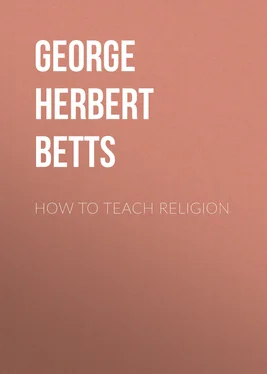George Herbert Betts - How to Teach Religion
Здесь есть возможность читать онлайн «George Herbert Betts - How to Teach Religion» — ознакомительный отрывок электронной книги совершенно бесплатно, а после прочтения отрывка купить полную версию. В некоторых случаях можно слушать аудио, скачать через торрент в формате fb2 и присутствует краткое содержание. Жанр: foreign_prose, Религиозная литература, foreign_religion, foreign_edu, foreign_antique, на английском языке. Описание произведения, (предисловие) а так же отзывы посетителей доступны на портале библиотеки ЛибКат.
- Название:How to Teach Religion
- Автор:
- Жанр:
- Год:неизвестен
- ISBN:нет данных
- Рейтинг книги:5 / 5. Голосов: 1
-
Избранное:Добавить в избранное
- Отзывы:
-
Ваша оценка:
- 100
- 1
- 2
- 3
- 4
- 5
How to Teach Religion: краткое содержание, описание и аннотация
Предлагаем к чтению аннотацию, описание, краткое содержание или предисловие (зависит от того, что написал сам автор книги «How to Teach Religion»). Если вы не нашли необходимую информацию о книге — напишите в комментариях, мы постараемся отыскать её.
How to Teach Religion — читать онлайн ознакомительный отрывок
Ниже представлен текст книги, разбитый по страницам. Система сохранения места последней прочитанной страницы, позволяет с удобством читать онлайн бесплатно книгу «How to Teach Religion», без необходимости каждый раз заново искать на чём Вы остановились. Поставьте закладку, и сможете в любой момент перейти на страницу, на которой закончили чтение.
Интервал:
Закладка:
Our knowledge and mastery must always be much broader than the material we actually present. It must be deeper and our grasp more complete than can be reached by our pupils. For only this will give us the mental perspective demanded of the teacher. Only this will enable our thought to move with certainty and assurance in the field of our instruction. And only this will win the confidence and respect of our pupils who, though their minds are yet unformed, have nevertheless a quick sense for mastery or weakness as revealed in their teacher.
A danger confronted by teachers in church schools.—Teachers in our church schools are at a disadvantage at this point. They constitute a larger body than those who teach in the day schools, yet the vast army who teach our children religion receive no salaries. They are engaged in other occupations, and freely give their services as teachers of religion with no thought of compensation or reward. The time and enthusiasm they give to the Sunday school is a free-will offering to a cause in which they believe. All this is inspiring and admirable, but it also contains an element of danger.
For it is impossible to set up scholastic and professional standards for our teachers of religion as we do for the teachers in our day schools. The day-school teacher, employed by the state and receiving public funds, must go through a certain period of training for his position. He must pass examinations in the subject matter he is to teach, and in his professional fitness for the work of the teacher. He must have a certificate granted by responsible authorities before he can enter the schoolroom. He must show professional growth while in service if he is to receive promotion or continue in the vocation.
Greater personal responsibility on church school teacher.—Naturally, all this is impossible with volunteer teachers who receive no pay for their services and are not employed under legal authority. No compulsion can be brought to bear; all must rest on the sense of duty and of opportunity of the individual teacher. Yet the Sunday school teacher needs even a more thorough background of preparation than the day-school teacher, for the work of instruction in the Sunday school is almost infinitely harder than in the day school. Religion and morals are more difficult to teach than arithmetic and geography. The church building usually lacks adequate classroom facilities. The lesson material is not as well graded and adapted to the children as the day-school texts. The lessons come but once a week, and the time for instruction is insufficient. The children do not prepare their lessons, and so come to the Sunday school lacking the mental readiness essential to receiving instruction.
This all means that the Sunday school teacher must rise to a sense of his responsibilities. He must realize that he holds a position of influence second to none in the spiritual development of his pupils. He must remember that he is dealing with a seed-time whose harvest involves the fruits of character and destiny. With these facts in mind he must ask himself whether he is justified in standing before his class as teacher without having given the time and effort necessary for complete preparation.
The teacher and his Bible.—The teacher should know his Bible. This means far more than to know its text and characters. The Bible is history, it is literature, it is a treatise on morals, it is philosophy, it is a repository of spiritual wisdom, it is a handbook of inspiration and guidance to the highest life man has in any age conceived.
To master the Bible one must have a background of knowledge of the life and history of its times. He must enter into the spirit and genius of the Hebrew nation, know their aspirations, their political and economic problems, and understand their tragedies and sufferings. He must know the historical and social setting of the Jewish people, the nations and civilizations that surrounded them, and the customs, mode of life, and trend of thought of contemporaneous peoples.
Not all of these things can be learned from the Bible itself. One must make use of the various helps and commentaries now available to Bible students. The religions of ancient Egypt, Assyria, Babylonia, Greece, and Rome should be studied. Ancient literatures should be placed under tribute, and every means employed to gain a working knowledge of the social medium out of which the Christian religion developed.
The teacher's knowledge of children.—Time was when we thought of the child as a miniature man, differing from adults on the physical side only in size and strength, and on the mental side only in power and grasp of thought. Now we know better. We know that the child differs from the adult not only in the quantity but also in the quality of his being.
It is the business of the teacher to understand how the child thinks . What is the child's concept of God? What is the character of the child's prayer? How does the child feel when he takes part in the acts of worship? We talk to the child about serving God; what is the child's understanding of service to God? We seek to train the child to loyalty to the church; what does the church stand for to the child? We teach the child about sin and forgiveness; just what is the child's comprehension of sin, and what does he understand by forgiveness? We tell the child that he must love God and the Christ; can a child control his affections as he will, or do they follow the trend of his thoughts and experiences? These are not idle questions. They are questions that must be answered by every teacher who would be more than the blind leader of the blind.
Coming to know the child.—How shall the teacher come to know the child? Professor George Herbert Palmer sets forth a great truth when he says that the first quality of a great teacher is the quality of vicariousness . By this he means the ability on the part of the teacher to step over in his imagination and take the place of the child. To look at the task with the child's mind and understanding, to feel the appeal of a lesson or story through the child's emotions, to confront a temptation with the child's power of will and self-control—this ability is the beginning of wisdom for those who would understand childhood. The teacher must first of all, therefore, be a sympathetic investigator in the laboratory of child life. Not only in the Sunday school, but daily, he must observe, study, seek to interpret children .
Nor should the teacher of religion neglect the books on the child and his religion. Many investigators are giving their time and abilities to studying child nature and child religion. A mastery of their findings will save us many mistakes in the leadership and training of children. A knowledge of their methods of study will show us how ourselves more intelligently to study childhood. Comprehension of the principles they represent, coupled with the results of our own direct interpretation of children, will convince us that, while each child differs from every other, certain fundamental laws apply to all childhood . It is the teacher's task and privilege to master these laws.
Knowledge of technique.—Teaching is an art , which must be learned the same as any other art. True, there are those who claim that anyone who knows a thing can teach it; but often the teacher who makes such a claim is himself the best refutation of its validity when he comes before his class. Probably most of us have known eminent specialists in their field of learning who were but indifferent teachers. It is not that they knew too much about their subjects, but that they had not mastered the art of its presentation to others.
The class hour is the teacher's great opportunity. His final measure as a teacher is taken as he stands before his class in the recitation. Here he succeeds or fails. In fact, here the whole system of religious education succeeds or fails. For it is in this hour, where the teacher meets his pupils face to face and mind to mind, that all else culminates. It is for this hour that the Sunday school is organized, the classrooms provided, and the lesson material prepared. It is in this hour that the teacher succeeds in kindling the interest, stirring the thought and feeling, and grounding the loyalty of his class. Or, failing in this, it is in the recitation hour that the teacher leaves the spiritual life of the child untouched by his contact with the Sunday school and so defeats its whole intent and purpose.
Читать дальшеИнтервал:
Закладка:
Похожие книги на «How to Teach Religion»
Представляем Вашему вниманию похожие книги на «How to Teach Religion» списком для выбора. Мы отобрали схожую по названию и смыслу литературу в надежде предоставить читателям больше вариантов отыскать новые, интересные, ещё непрочитанные произведения.
Обсуждение, отзывы о книге «How to Teach Religion» и просто собственные мнения читателей. Оставьте ваши комментарии, напишите, что Вы думаете о произведении, его смысле или главных героях. Укажите что конкретно понравилось, а что нет, и почему Вы так считаете.











